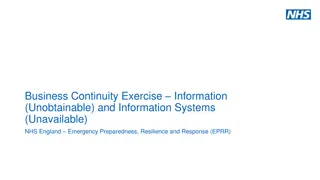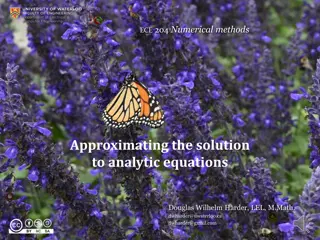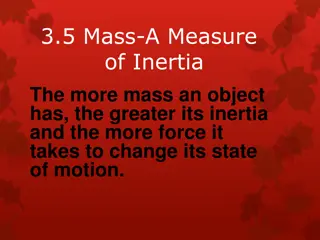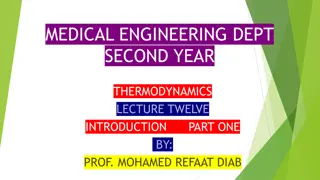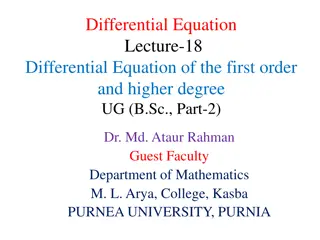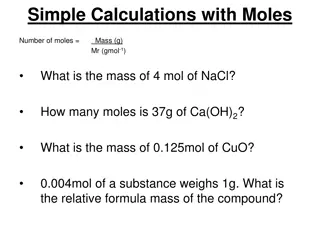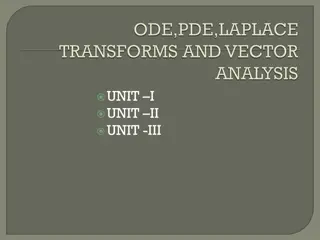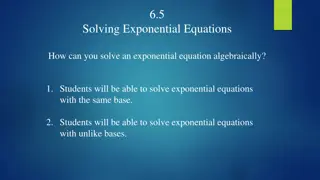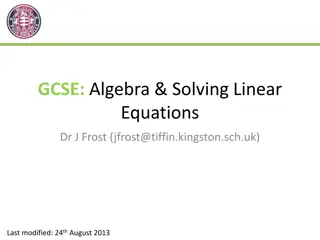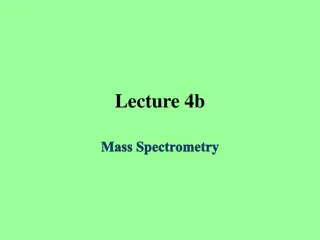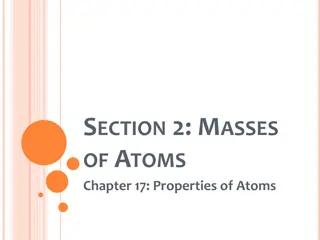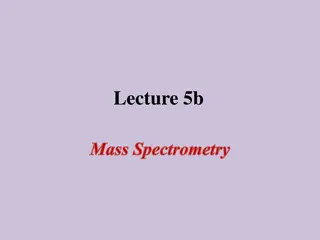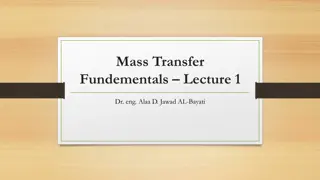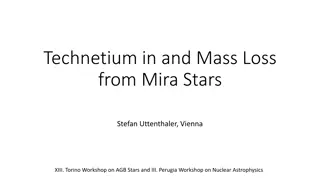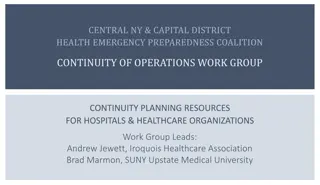Business Continuity Exercise Information and NHS England Emergency Preparedness
The content focuses on a business continuity exercise related to NHS England Emergency Preparedness, emphasizing the importance of evaluating and enhancing business continuity plans. It covers elements of business continuity management, exercise objectives, ground rules, scenario background, and res
3 views • 16 slides
Understanding Mass Media and Communication for the Academic Year 2020/2021
This content delves into the science of media, communication, and mass communication for the academic year 2020/2021. It explores the role of mass media in public communication, the characteristics of mass media, and the various types of mass media such as books, print media, films, radio, televisio
8 views • 11 slides
Understanding Chemical Reactions: Reactants, Products, and Balancing Equations
Chemical reactions involve reactants that transform into products. Balancing equations is essential to ensure the conservation of mass. Learn about decomposition reactions, chemical equations, and methods to balance equations effectively.
4 views • 39 slides
Unveiling the Best Mass Gainers in India for Maximum Muscle Growth
Discover the ultimate solution for achieving your muscle-building goals with the best mass gainers available in India. Our comprehensive guide delves into the top-rated products designed to support your mass gain journey effectively. Whether you're a beginner or a seasoned fitness enthusiast, these
6 views • 1 slides
Understanding Numerical Methods for Approximating Analytic Equations
Introduction to approximating solutions to analytic equations, focusing on differential equations, integral equations, and integro-differential equations. Exploring ordinary and partial derivatives, differential and integral equations, and the involvement of unknown functions and their derivatives a
2 views • 15 slides
Understanding Mass and Inertia in Physics
Mass and inertia are fundamental concepts in physics. Mass is the amount of material in an object, determining its inertia - the resistance to change in motion. Objects with greater mass require more force to change their state of motion. Mass should not be confused with volume or weight, as they ar
0 views • 21 slides
Gas-Liquid Equipment in Mass Transfer Operations
Gas-liquid operations play a crucial role in mass transfer processes by facilitating intimate contact between the two fluids for efficient interphase diffusion. Various equipment such as sparged vessels (bubble columns) and mechanically agitated vessels are used to disperse gas or liquid phases, pro
2 views • 27 slides
Understanding Maxwell Equations in Thermodynamics
In thermodynamics, Maxwell equations are derived using Euler's reciprocity relation. They involve characteristic functions such as internal energy, free energy, enthalpy, and Gibbs free energy, along with parameters like temperature, entropy, pressure, and volume. These equations form the foundation
0 views • 15 slides
Differential Equations of First Order & Higher Degree: Lecture 18
This lecture covers differential equations of first order but not of the first degree, general forms of such equations, methods for solving them, and examples of differential equations to be solved. The content includes detailed explanations, equations, solutions, and problem-solving techniques.
0 views • 9 slides
Understanding Linear Equations in Algebra: A Comprehensive Overview
An exploration of algebraic expressions, equations, and linear equations in one variable with detailed explanations and examples. Discover the fundamental concepts, solving methods, and applications of linear equations in various word problems. Master the art of transforming mathematical expressions
0 views • 15 slides
Understanding Mole Calculations in Chemistry
Explore various mole calculations in chemistry such as determining mass from moles, moles from mass, and comparing particles in different substances. Learn how to calculate the mass of substances, the number of particles, and perform calculations using balanced equations. Dive into concepts like mol
0 views • 49 slides
Business Continuity Planning: Best Practices and Challenges
Explore the world of Business Continuity Planning (BCP) through the lens of best practices and challenges. Delve into the structured implementation of common sense strategies for ensuring operational resilience, particularly in times of crisis like COVID-19. Learn from the experiences and insights s
0 views • 23 slides
Understanding Differential Equations: Types, Classification, and Solutions
Differential equations are mathematical equations that relate independent and dependent variables through differential coefficients. They can be classified as ordinary or partial, based on the types of derivatives involved. The order and degree of a differential equation, as well as its linearity an
3 views • 26 slides
Understanding Differential Equations in Economics Honours
Differential equations, introduced by Newton and Leibniz in the 17th century, play a key role in economics. These equations involve derivatives and represent implicit functional relationships between variables and their differentials, often related to time functions. The order and degree of a differ
1 views • 16 slides
Introduction to Differential Equations and Laplace Equations
Understanding differential equations of various orders, solving methods, linear and non-linear equations, ordinary and partial differential equations, definitions of solutions, and general vs. particular solutions in the context of Differential Equations and Laplace Equations.
1 views • 20 slides
Understanding Differential Equations: Basics to Applications
Differential equations are fundamental in mathematics, with various types such as first-order, partial, and Clairaut's equations explored in this content. The content covers general equations, solutions, and examples, providing insights into linear and higher-order equations with constant coefficien
0 views • 20 slides
Understanding Healthcare Business Continuity in Crisis Situations
Healthcare Business Continuity is crucial for ensuring uninterrupted service delivery during emergencies. This executive briefing delves into the challenges faced by medical facilities during crises, such as Hurricane Sandy, and highlights the importance of robust planning, like in the case of Bon S
0 views • 17 slides
Understanding Partial Differential Equations of Second Order
Exploring the concepts of second-order partial differential equations in mathematics, including the general form, linear equations with variable coefficients, and equations with constant coefficients. Learn about integral solutions, examples, and techniques for solving these equations with detailed
0 views • 21 slides
Understanding Effective Mass in Crystals: Insights and Applications
The concept of effective mass in crystals delves into how electrons interact with the lattice potential, leading to altered particle masses that affect their behavior. This phenomenon is crucial in applying electrodynamics equations to charge carriers in solids, where the electron mass can differ fr
0 views • 18 slides
Understanding Orbital Mechanics: Kepler's Laws, Center of Mass, and Equation of Motion
Exploring the fundamental concepts in orbital mechanics including Kepler's Laws, center of mass calculations, and equations of motion for celestial bodies. Topics covered include the laws of planetary motion, center of mass reference frame, and the concept of reduced mass in celestial mechanics.
0 views • 15 slides
Solving Exponential Equations Algebraically
Learn how to solve exponential equations algebraically with the same base and unlike bases. Understand the properties of equality for exponential equations and practice solving various equations step by step. Improve your skills in rewriting equations with the same base and applying the rules of exp
0 views • 9 slides
Understanding Mass, Volume, and Density in Physics
Matter, which makes up the universe, has mass and volume. Learn the differences between mass and volume, and weight, as well as how to measure them accurately. Discover why a ton of bricks and a ton of feathers have the same mass but different volume. Understanding the concepts of mass, volume, and
3 views • 12 slides
Emergency Management and Continuity Planning at ECU
Emergency management and continuity planning play crucial roles at East Carolina University (ECU), ensuring the protection of the university's mission and operations during crises. This includes creating frameworks to reduce vulnerability to hazards, cope with disasters, and maintain operational con
0 views • 40 slides
GCSE Algebra Revision Materials and Equations Practice
Explore a collection of GCSE algebra revision materials, including solving linear equations and common mishaps in algebraic simplification. Practice setting up equations and solving linear equations with provided examples and questions. Enhance your algebra skills through comprehensive content desig
0 views • 15 slides
Guide to Mass Transfer in Chemical Engineering: Equations and Contactor Types
This comprehensive guide by Ahmed Al-Marjibi is tailored for junior chemical engineering students studying heat and mass transfer. It covers various mass contactor types and detailed equations for continuous and semi-batch contactors to facilitate learning in this field.
0 views • 29 slides
A Brief Overview of Mass Spectrometry and Its Historical Significance
Mass spectrometry is a powerful analytical technique used to determine the masses of particles. This summary provides insights into the history of mass spectrometry, key contributions by notable scientists, electron impact mass spectrometry, connection with gas chromatography, fragmentation patterns
0 views • 10 slides
Understanding Atomic Mass and Isotopes in Atoms
Explore the concept of atomic mass in atoms, learn to compute atomic mass and mass number, identify isotopes, and calculate the number of neutrons in an atom. Understand the significance of the atomic number and mass number in determining the characteristics of elements.
0 views • 14 slides
Understanding Mass Spectrometry: From History to Techniques
Explore the fascinating history of mass spectrometry, from the discovery of isotopes by J.J. Thomson and F.W. Aston to modern developments like the quadrupole mass spectrometer. Learn about Electron Impact Mass Spectrometry, its techniques, and the information derived from mass spectra, including mo
0 views • 15 slides
Understanding Center of Mass in Physics
Exploring the concept of Center of Mass, this content delves into topics such as calculations, real-life examples, and scenarios involving the distribution of mass in different objects. From the mass of the Earth to practical applications in physics, the importance of determining the center of mass
0 views • 79 slides
Fundamentals of Mass Transfer: Lecture Highlights with Dr. Alaa D. Jawad AL-Bayati
This content covers the basics of mass transfer, including the definition, types, properties used for mass transfer, mass transfer rate, Fick's law, and factors influencing transfer rate in chemical reactions. Dr. Alaa D. Jawad AL-Bayati provides insights into the mechanisms and processes involved i
0 views • 9 slides
Insights into Mass Loss from Mira Stars
Stefan Uttenthaler discusses technetium presence and mass loss in Mira stars, emphasizing the detection of radioactive element Tc in their spectra and exploring variations in color, dust mass-loss rate, and gas mass-loss rate among Tc-poor and Tc-rich M-type Miras. Research also delves into the s-pr
0 views • 20 slides
Understanding Mass Spectrometry Principles and Applications
Mass spectrometry is a powerful analytical technique used to determine the molecular mass, formula, and structural features of compounds. By ionizing molecules in a mass spectrometer, it generates molecular ions that reveal valuable information about the composition of the compound. Isotope peaks he
0 views • 33 slides
Enhancing Patient Care Through Continuity in General Practice
Continuity of care in general practice is crucial for improving patient outcomes and experiences. Maintaining a consistent relationship with a GP or healthcare team leads to better medical adherence, enhanced doctor-patient relationships, reduced hospital visits, and overall improved health outcomes
0 views • 15 slides
Understanding Mass and Inertia in Physics
Understanding the concepts of mass and inertia in physics is essential for comprehending the behavior of objects in motion. Mass is the measure of the quantity of inertia of an object, affecting its resistance to changes in motion. In translational cases, inertia is termed as mass, measured in kilog
0 views • 8 slides
Importance of Disaster Recovery and Business Continuity Planning
Disaster recovery and business continuity planning are crucial for businesses to survive major disasters and continue operations. This involves assessing business impacts, creating documentation, and planning for various types of disasters. Failure to plan can lead to significant revenue loss, damag
0 views • 46 slides
Understanding the Concept of Molar Mass in Chemistry
Explore the concept of molar mass in chemistry, including the definition of the mole, Avogadro's number, calculations for molar mass of elements and compounds, and examples of determining molar mass. Discover how to find the molar mass of various compounds through practical examples.
0 views • 39 slides
Understanding Molar Mass and Conversions in Chemistry
Explore the concept of molar mass, moles of atoms, and conversions between mass and moles in chemistry through an engaging lesson on toxins, stoichiometry, solution chemistry, and acids and bases. Learn how to calculate molar mass, describe the magnitude of a mole of a substance, and conduct simple
0 views • 10 slides
Healthcare Continuity Planning: Resources and Objectives for Hospitals
Ensuring continuity of operations is crucial for healthcare organizations. The COOP Work Group focuses on developing resources and tools for hospitals to sustain essential functions during emergencies. Established in 2015, the group has created planning checklists, conducted training, and developed
0 views • 7 slides
Understanding Mass Continuity Equations and Convergence-Divergence in Atmospheric Dynamics
Explore the concepts of mass continuity equations in geometric and pressure coordinates, linking them to conservation of mass. Delve into the implications for vertical motion and weather systems' coherence. Understand the role of divergence and convergence in determining vertical motion patterns. Al
0 views • 15 slides
Understanding Fixpoint Equations in Programming Languages
Fixpoint equations play a crucial role in programming languages for solving mutually recursive problems like parsing and dataflow analysis. This content explores the concepts of fixpoint equations, assumptions for ensuring solutions, computing solutions, and generalizations for cases with greatest e
0 views • 31 slides
